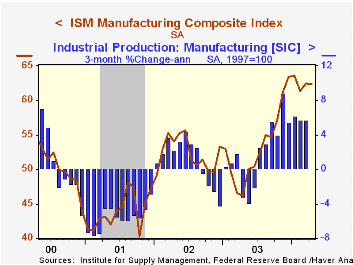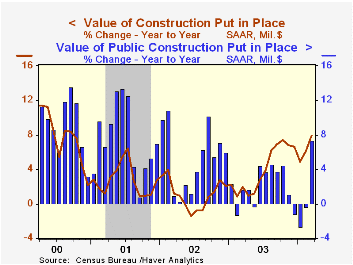 Global| May 03 2004
Global| May 03 2004ISM Factory Index About Unchanged
by:Tom Moeller
|in:Economy in Brief
Summary
The Purchasing Managers Composite Index (PMI) for April released by the Institute of Supply Management was little changed at 62.4 versus 62.5 in March. Consensus expectations were for 62.5. During the last twenty years there has been [...]

The Purchasing Managers’ Composite Index (PMI) for April released by the Institute of Supply Management was little changed at 62.4 versus 62.5 in March. Consensus expectations were for 62.5.
During the last twenty years there has been a 71% correlation between the level of the Composite Index and the three month growth in factory sector industrial production. There has been a 56% correlation between the level of the Composite Index and quarterly growth in real GDP.
Patterns amongst the component series were mixed. Production jumped to 67.0 vs. 65.5 in March and from 48.8 a year ago while employment rose to 57.8, the highest level since December of 1987. These gains were offset by a lower orders index (65.0 vs. 65.7), a slightly quicker pace of vendor deliveries (67.1 vs. 67.9) and a lower inventory index which fell to the lowest level since October (44.8 vs.48.3).
The prices paid index strengthened further to 88.0, the highest level since July 1979.
| ISM Manufacturing Survey | April | Mar | April '03 | 2003 | 2002 | 2001 |
|---|---|---|---|---|---|---|
| Composite Index | 62.4 | 62.5 | 46.2 | 53.3 | 52.4 | 43.9 |
| New Orders Index | 65.0 | 65.7 | 45.9 | 58.1 | 56.6 | 46.1 |
| Prices Paid Index (NSA) | 88.0 | 86.0 | 63.5 | 59.6 | 57.6 | 42.9 |
by Tom Moeller May 3, 2004

The total value of construction put in place jumped 1.5% in March following an upwardly revised 0.4% gain in February. A 0.5% rise had been the Consensus expectation.
A 5.2% jump in public construction led the March gain as spending on highways & streets (nearly one third of the value of public constructions spending) surged 9.8% (13.7% y/y).Transportation spending also surged 8.5% (6.0% y/y) and spending on power ballooned 15.6% (63.8% y/y).
Private residential building activity rose 0.7% following a modest decline in February as multi-family home building jumped 2.7% (8.2% y/y) and prior months' figures were revised up. New single family building rose 1.1% (19.9% y/y).
Nonresidential building fell 0.2% (-2.9% y/y) following a 1.4% gain in February.
These more detailed categories represent the Census Bureau’s reclassification of construction activity into end-use groups. Finer detail is available for many of the categories; for instance, commercial construction is shown for Automotive sales and parking facilities, drugstores, building supply stores, and both commercial warehouses and mini-storage facilities. Note that start dates vary for some seasonally adjusted line items in 2000 and 2002 and that constant-dollar data are no longer computed.
| Construction Put-in-place | Mar | Feb | Y/Y | 2003 | 2002 | 2001 |
|---|---|---|---|---|---|---|
| Total | 1.5% | 0.4% | 7.9% | 4.0% | 1.1% | 2.7% |
| Private | 0.4% | 0.4% | 8.0% | 4.6% | -0.2% | 1.4% |
| Residential | 0.7% | -0.0% | 13.4% | 10.1% | 8.6% | 3.3% |
| Nonresidential | -0.2% | 1.4% | -2.9% | -5.5% | -13.0% | -1.3% |
| Public | 5.2% | 0.4% | 7.4% | 2.1% | 5.3% | 7.4% |
Tom Moeller
AuthorMore in Author Profile »Prior to joining Haver Analytics in 2000, Mr. Moeller worked as the Economist at Chancellor Capital Management from 1985 to 1999. There, he developed comprehensive economic forecasts and interpreted economic data for equity and fixed income portfolio managers. Also at Chancellor, Mr. Moeller worked as an equity analyst and was responsible for researching and rating companies in the economically sensitive automobile and housing industries for investment in Chancellor’s equity portfolio. Prior to joining Chancellor, Mr. Moeller was an Economist at Citibank from 1979 to 1984. He also analyzed pricing behavior in the metals industry for the Council on Wage and Price Stability in Washington, D.C. In 1999, Mr. Moeller received the award for most accurate forecast from the Forecasters' Club of New York. From 1990 to 1992 he was President of the New York Association for Business Economists. Mr. Moeller earned an M.B.A. in Finance from Fordham University, where he graduated in 1987. He holds a Bachelor of Arts in Economics from George Washington University.
More Economy in Brief
 Global| Feb 05 2026
Global| Feb 05 2026Charts of the Week: Balanced Policy, Resilient Data and AI Narratives
by:Andrew Cates






